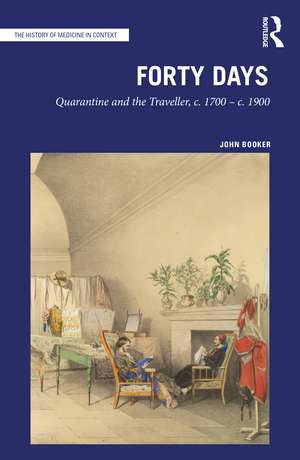Forty Days: Quarantine and the Traveller, c. 1700 - c. 1900: The History of Medicine in Context
Autor John Bookeren Limba Engleză Hardback – 20 sep 2021
Din seria The History of Medicine in Context
-
 Preț: 311.70 lei
Preț: 311.70 lei -
 Preț: 311.41 lei
Preț: 311.41 lei -
 Preț: 325.55 lei
Preț: 325.55 lei -
 Preț: 386.77 lei
Preț: 386.77 lei - 16%
 Preț: 338.33 lei
Preț: 338.33 lei -
 Preț: 489.26 lei
Preț: 489.26 lei -
 Preț: 492.53 lei
Preț: 492.53 lei -
 Preț: 469.34 lei
Preț: 469.34 lei - 18%
 Preț: 1000.27 lei
Preț: 1000.27 lei -
 Preț: 323.23 lei
Preț: 323.23 lei - 25%
 Preț: 824.80 lei
Preț: 824.80 lei - 18%
 Preț: 1054.71 lei
Preț: 1054.71 lei -
 Preț: 489.26 lei
Preț: 489.26 lei - 17%
 Preț: 819.35 lei
Preț: 819.35 lei - 22%
 Preț: 324.16 lei
Preț: 324.16 lei -
 Preț: 497.92 lei
Preț: 497.92 lei - 31%
 Preț: 764.20 lei
Preț: 764.20 lei -
 Preț: 469.34 lei
Preț: 469.34 lei -
 Preț: 486.76 lei
Preț: 486.76 lei - 25%
 Preț: 823.44 lei
Preț: 823.44 lei - 5%
 Preț: 464.79 lei
Preț: 464.79 lei - 18%
 Preț: 1009.74 lei
Preț: 1009.74 lei - 18%
 Preț: 1054.71 lei
Preț: 1054.71 lei - 17%
 Preț: 346.02 lei
Preț: 346.02 lei - 5%
 Preț: 1158.84 lei
Preț: 1158.84 lei -
 Preț: 489.26 lei
Preț: 489.26 lei -
 Preț: 469.34 lei
Preț: 469.34 lei - 18%
 Preț: 1110.92 lei
Preț: 1110.92 lei - 18%
 Preț: 1055.51 lei
Preț: 1055.51 lei -
 Preț: 469.34 lei
Preț: 469.34 lei - 26%
 Preț: 765.04 lei
Preț: 765.04 lei -
 Preț: 489.26 lei
Preț: 489.26 lei - 18%
 Preț: 1008.17 lei
Preț: 1008.17 lei - 18%
 Preț: 1006.77 lei
Preț: 1006.77 lei - 18%
 Preț: 1054.71 lei
Preț: 1054.71 lei
Preț: 1160.74 lei
Preț vechi: 1221.83 lei
-5% Nou
222.12€ • 232.68$ • 184.08£
Carte tipărită la comandă
Livrare economică 08-22 aprilie
Specificații
ISBN-10: 1032050349
Pagini: 232
Ilustrații: 1 Halftones, color; 51 Halftones, black and white; 1 Illustrations, color; 51 Illustrations, black and white
Dimensiuni: 156 x 234 x 14 mm
Greutate: 0.5 kg
Ediția:1
Editura: Taylor & Francis
Colecția Routledge
Seria The History of Medicine in Context
Locul publicării:Oxford, United Kingdom
Cuprins
Notă biografică
Descriere
Forty Days: Quarantine and the Traveller, c. 1700 - c. 1900 provides a timely reminder that no traveller in past centuries could return from the East without spending up to forty days in a lazaretto to ensure that no symptoms of plague were developing. Quarantine was performed in virtual prisons ranging from mud huts in the Danube basin to a converted fort on Malta, evoking every emotion from hatred and hostility through to resignation and even contentment. Drawing on the diaries and journals of some 300 men and women of many nationalities over more than two centuries, the author describes the inadequate accommodation, poor food and crushing boredom experienced by detainees. The book also draws attention to comradeship, sickness, and death in detention, and Casanova's unique ability to do what he did best even in the lazaretto of Ancona. Other well-known detainees included Hans Christian Andersen, Mark Twain and Sir Walter Scott. Lavishly illustrated, the work includes a gazetteer of forty-nine lazarettos in Europe and Asia Minor, with inmates' comments on each. This book will appeal to all those interested in the history of medicine and the history of travel.
